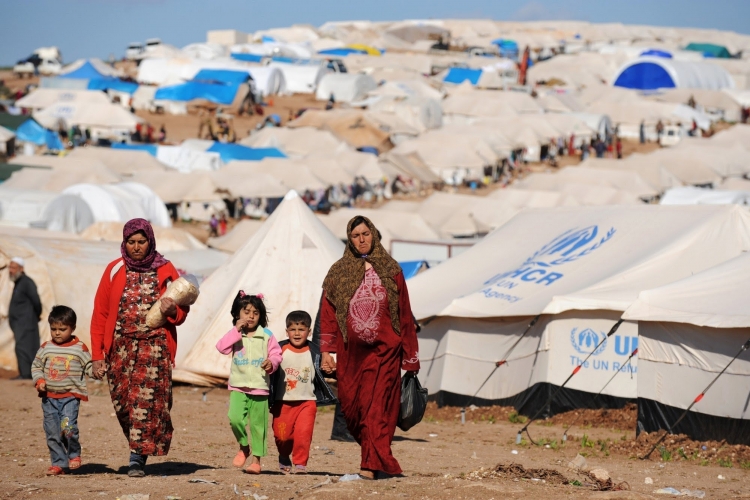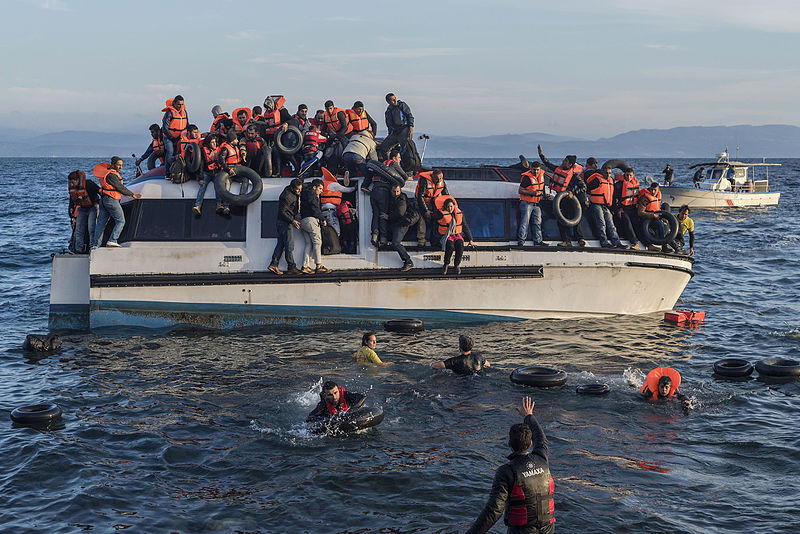Human Rights Threatened by Proposed EU-Turkey Deal

In response to the almost 3,000 Syrian refugees arriving per day on the Greek islands, the European Union has begun discussions with Turkey over a deal intended to legally settle Syrian refugees throughout Europe. However, many question not only the legality but the morality of a deal that seems to prioritize quick fixes over human rights.
In 1948, as an attempt to prevent humanity from repeating the atrocities committed throughout WWII, the Universal Declaration of Human Rights was created. Recognizing the horrors that resulted from countries turning fleeing Jews from their boarders, one declaration made was that access to asylum was an incontestable human right. Further more, in 1951 the UN Refugee Convention was created in order to provide a legal basis for signatory countries to offer asylum to refugees. These documents, Patrick Kingsley (Guardian migration correspondent) states, "Were created on the basis that, whatever the cost, there are some eternal values that are worth upholding in a civilized society."
While the proposed migration deal has yet to be ratified, as it stands now, it would break the terms of the 1951 Convention.
What does the deal involve?
The deal proposed is a simple one-in, one-out strategy. What this means is that for every one Syrian refugee returned from Greece to Turkey, one will be legally settled within Europe.
In addition, in an attempt to stem the multi-billion dollar smuggling industry that has developed in wake of the heightening refugee crisis, the proposed deal states that any refugee who illegally crosses into Greece will be placed at the back of the line of those seeking asylum in Europe.
Image Credit: GoogleImages/GgiaSo, what are the various legal and ethical issues surrounding the EU-Turkey deal?
One of the main issues human rights groups have taken against the deal is that there is no assessment being made of Turkey and the conditions refugees will be forced to return to. In fact, it is widely known that most refugees currently residing in Turkey lack access to jobs, education, and personal safety — all things meant to be guaranteed by the 1951 treaty. Additionally, Turkey has been accused of sending refugees back to warzones, despite international law stating that asylum seekers must only be returned to a country that will protect them from being forced back to the place they originally fled.
Further more, the 1951 convention determined that refugees must be looked at as individual cases if they are to be relocated. However, it is outlined in the EU-Turkey deal to instead return Syrian refugees as a whole, in turn violating the 1951 treaty. Filippo Grandi, the UN high commissioner for refugees was quoted stating, "As a first reaction I am deeply concerned about any arrangement that would involve the blanket return of anyone from one country to another, without spelling out the refugee protection safeguards under international law."
What is Turkey demanding in return?
Currently the European Union is desperate to stem the ever-increasing flow of refugees into an already financially crippled Greece. Unfortunately, this is a weakness Turkey is keen to capitalize on as they recently unveiled their list of conditions that Prime Minister Ahmet Davutoglu states are each necessary to gain their assistance in the matter.
In return for accepting Syrian refugees back on their soil, Turkey has asked for an estimated €3 billion (supposedly to help provide aid for incoming refugees), easier access to European visas for Turks, and an accelerated discussion of Turkey joining the European Union — despite Turkey's current issues with authoritarianism.
Image Credit: Youtube/euronewsIf implemented, would the EU-Turkey deal be practical and effective in ending the refugee crises?
Looking at the EU-Turkey deal, many are skeptical that it will be successful in fulfilling the goals it states it intends to. In the wake of the unsuccessful refugee relocation scheme, in which only 660 out of the promised 160,000 refugees have been settled, it appears doubtful that the EU deal's one-in one-out plan will be upheld.
In light of the EU's past failures to see through proposed plans, Syrian refugees now feel they must take matters into their own hands, vowing that if the Greek border is closed they will "find a way." This could mean that instead of the proposed deal limiting the refugee smuggling business, it could serve only to increase the cost and the risk of making the trip to another destination.
EU leaders hope to ratify the highly controversial deal with Turkey on Thursday at a summit in Brussels. However, due to international outrage and concern over the probable consequences that are linked to implementing said deal, there will likely be numerous revisions made before the deal could ever hope to be successfully upheld.
In the meantime, the question remains geared to what can be done to aid the hundreds of thousands of refugees currently stranded in a dangerously weakened Greece that has no ability to support them. At this point every day is crucial in the success of any attempt to turn the crisis around.
The world's eyes now look to Thursday's summit in the hopes that the European Union has come up with a plan of action that does not forsake human rights for the mere pleasure of saying 'we tried.'
Image Credit: Youtube/WallStreetJournal







